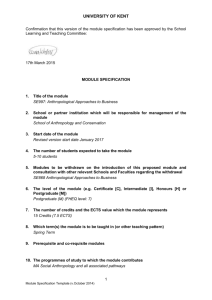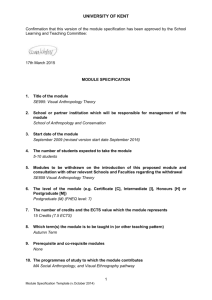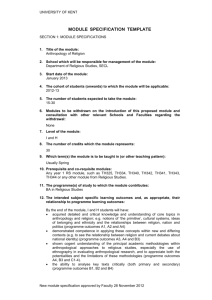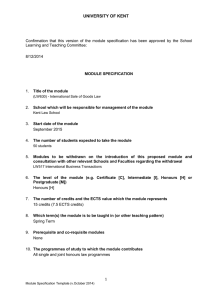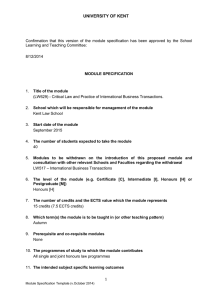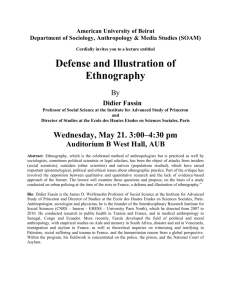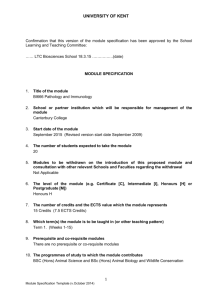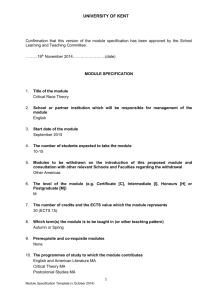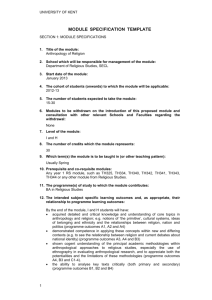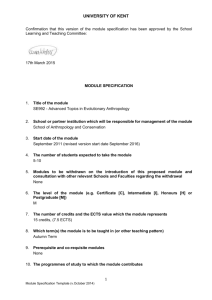University of Kent
advertisement
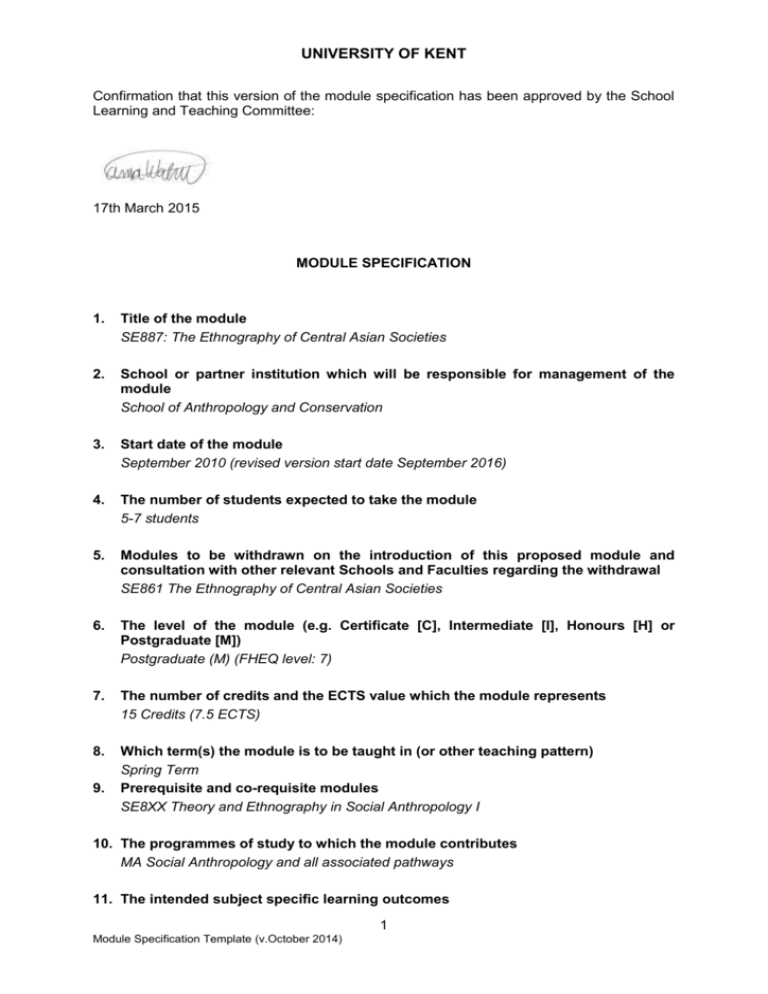
UNIVERSITY OF KENT Confirmation that this version of the module specification has been approved by the School Learning and Teaching Committee: 17th March 2015 MODULE SPECIFICATION 1. Title of the module SE887: The Ethnography of Central Asian Societies 2. School or partner institution which will be responsible for management of the module School of Anthropology and Conservation 3. Start date of the module September 2010 (revised version start date September 2016) 4. The number of students expected to take the module 5-7 students 5. Modules to be withdrawn on the introduction of this proposed module and consultation with other relevant Schools and Faculties regarding the withdrawal SE861 The Ethnography of Central Asian Societies 6. The level of the module (e.g. Certificate [C], Intermediate [I], Honours [H] or Postgraduate [M]) Postgraduate (M) (FHEQ level: 7) 7. The number of credits and the ECTS value which the module represents 15 Credits (7.5 ECTS) 8. Which term(s) the module is to be taught in (or other teaching pattern) Spring Term Prerequisite and co-requisite modules SE8XX Theory and Ethnography in Social Anthropology I 9. 10. The programmes of study to which the module contributes MA Social Anthropology and all associated pathways 11. The intended subject specific learning outcomes 1 Module Specification Template (v.October 2014) UNIVERSITY OF KENT On successfully completing the module MA students will be able to: 1) Understand the cultural diversity of Central Asia 2) Demonstrate knowledge of the countries of the region and their important ecological and geographical features 3) Demonstrate knowledge of the principal ethnic groups and their livelihoods, kinship organisation, gender relations, and epistemologies 4) Appreciate how ethnography contributes to theory 5) Discuss key issues and debates in the Central Asian ethnographic literature 6) Critically discuss these groups and their communities in terms of social changes in the region 7) Rethink some of their own cultural assumptions in terms of the experience of native peoples of Central Asia 8) Understand how anthropologists form questions about ethnographic material 12. The intended generic learning outcomes On successfully completing the module MA students will be able to: 1) Use (and combine effectively) written, oral and visual modes of communication 2) Read, comprehend and assimilate texts written for a professional audience to solve problems 3) Work effectively within a small group 13. A synopsis of the curriculum This course is concerned with the ethnography of Central Asian societies ranging from Pakistan through Central Asia (Afghanistan, Iran, Turkey, and ex-Soviet Central Asian nations such as Tajikistan, Uzbekistan, and Kazakhstan) to the Caucasus. It briefly introduces the connected histories of civilisations and Turco-Persian cultures in this region, and in particular modern fieldwork, specifically growing academic scholarship following the collapse of the Soviet Union. Drawing upon ethnographies of southern Siberia, Central Asia, Inner Asia and the Caucasus this course will provide an overview of recent debates on issues such as religion, nationalism, migration, everyday economics, borders and environmental issues, as well as on local responses to the pervasive post-Soviet transformation of the region. The course argues that this relatively new field of regional anthropological research offers fresh and inspiring perspectives on long-standing anthropological debates such as morality, exchange, state, religion and imperial and colonial history. The key topics include: Imperialism and Modernity; Cold War legacies and PostSocialism; Borders, mobility and migration; Markets and economy; Religion, Secularism and Identity; Development and Environmental Issues. 14. Indicative Reading List • Dale Eickelman 2002. The Middle East and Central Asia: an anthropological approach (4th ed.) Englewood Cliffs: Prentice Hall. • Dale Eickelman 1999. Russia’s Muslim Frontiers. Indiana University Press. • Caroline Humphrey 2002. The unmaking of Soviet life: everyday economies after socialism. Ithaca; London: Cornell University Press. • Charles Lindholm 2002. The Islamic Middle East: tradition and change. Blackwell Publishing. • Mathijs Pelkmans 2006. Defending the Border: identity, religion and modernity in the Republic of Georgia. Cornell University Press. 2 Module Specification Template (v.October 2014) UNIVERSITY OF KENT • Jeff Sahadeo and Russell Zanca, eds. 2007 Everyday life in Central Asia. Bloomington: Indiana University Press. 15. Learning and Teaching Methods, including the nature and number of contact hours and the total study hours which will be expected of students, and how these relate to achievement of the intended module learning outcomes This module will be taught be means of a 1 hour lecture (shared with SE592) for 12 weeks and up to a total of 8 additional contact hours with the module convenor. Depending on the number of students enrolled in the module these contact hours will take the form of seminar groups and/or individual tutorials. Students will also be expected to devote a total of 130 hours to research, reading, coursework preparation and use of online resources provided via the Virtual Learning Environment (Moodle) for this module. Total Contact Hours: 20 Independent Study Hours: 130 Total Study Hours: 150 Table of subject and generic learning outcomes supported by these methods: Teaching & Learning Method Subject Learning Outcomes Generic Learning Outcomes Lectures 11.1, 11.2, 11.3, 11.4, 11.7, 11.8 Seminars/Tutorials 11.2, 11.5, 11.6 Independent study 11.1, 11.2, 11.3, 11.4, 11.7, 12.1, 12.2, 12.3 11.8 12.2, 12.3 16. Assessment methods and how these relate to testing achievement of the intended module learning outcomes The module is assessed by 100% coursework. Students will complete a critical book review of 2000 words (35%) and an individual research project of 3000 words (65%). Table of subject and generic learning outcomes supported by these methods: Assessment Method Subject Learning Outcomes Generic Learning Outcomes Critical Book Review 11.1, 1.2, 11.3, 11.4, 11.5 12.1, 12.2, 12.3 Individual Research Project 11.1, 11.2, 11.6, 11.7, 11.8 12.1, 12.2, 12.3 17. Implications for learning resources, including staff, library, IT and space This module requires little in the way of resources other than those already available. Library and School resources, both physical and digital, are regularly reviewed and the module reading list is revised on an annual basis with extra purchases made where necessary. The school's Director of Graduate Studies has responsibility for the staffing of this module. This is an optional module and can be suspended if the convenor or another member of staff is not available to teach it. 3 Module Specification Template (v.October 2014) UNIVERSITY OF KENT 18. The School recognises and has embedded the expectations of current disability equality legislation, and supports students with a declared disability or special educational need in its teaching. Within this module we will make reasonable adjustments wherever necessary, including additional or substitute materials, teaching modes or assessment methods for students who have declared and discussed their learning support needs. Arrangements for students with declared disabilities will be made on an individual basis, in consultation with the University’s disability/dyslexia support service, and specialist support will be provided where needed. 19. Campus(es) or Centre(s) where module will be delivered: Canterbury 4 Module Specification Template (v.October 2014)
